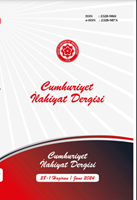ات الشلة لمع الافتاخ للم لأرررد للاتا رلبمرض
Some Criticisms on The Fatwa Methodology of The European Council for Fatwa
Author(s): Mustafa Bülent DadaşSubject(s): History of Islam, Contemporary Islamic Thought, Sociology of Religion, History of Religion, Qur’anic studies
Published by: Cumhuriyet Üniversitesi İlahyat Fakültesi
Keywords: Fiqh; Fiqh Councils; European Fatwa and Research Council; Fatwa; Fatwa Methodology;
Summary/Abstract: The European Council for Fatwa is a scholarly institution comprising a number of distinguished scholars, the majority of whom are based in the West. These scholars are familiar with both the Shari'ah evidences and associated problems. The Council was established in 1997 under the chairmanship of Yusuf al-Qaradawi (1926-2022). Since then, the Council addressed significant jurisprudential issues, particularly those pertaining to Muslims residing in the West and markedly distinct from the challenges observed in Muslim-majority countries. Its resolutions and fatwas have served as a reference point for both Muslims residing in these countries and other Muslims confronting analogous challenges. Moreover, the Council has emerged as a prominent scholarly authority on Islamic jurisprudence. Since its establishment, numerous studies have been conducted in various languages, including academic studies, on the structure of the Council and the fatwa method it follows in the context of general or specific issues such as transactions. At the meeting Istanbul in 2023, the Council devoted a significant portion of the proceedings to a comprehensive review of its activities and the criticisms directed against it. The meeting also saw the presentation of numerous papers that evaluated the Council from a variety of perspectives. To serve the same purpose, this study has been written to critically evaluate the method followed by the Council in issuing its fatwas in the context of the rules of fiqh and fatwa procedure. The evaluation is limited to the conditions of scientific competence and justice required of the mufti for a fatwa to be considered valid. In this context, an introduction was provided regarding the contribution of the fiqh councils to the science of fiqh. This was followed by a brief overview of the Council, highlighting its distinctive features and the ways in which it differs from other fiqh councils, particularly in terms of its approach to the field of "minority fiqh". The conditions necessary for the acceptance of a fatwa are analysed and explained by relying on well-known books of Islamic methodology. The compliance of the fatwas and decisions issued by the Council with these rules is discussed. In order to enable comparison with other fiqh Councils, the decisions and fatwas issued by them are also included. The study concluded that the Council did not comply with the rules of fatwa procedure set as a criterion, as it did not announced by whom the decisions and fatwas were issued. Furthermore, it was concluded that other fiqh councils were similarly overwhelmed with this problem. The study concludes with some recommendations for the solution of the problems identified. It is hoped that the study will contribute to the field by providing measures to guide the fatwa institutions in carrying out its activity within the framework of the fatwa process. In addition, it is hoped that it will raise awareness among researchers and muftis who act on, make use of in their studies or issue fatwas based on the decisions and fatwas of institutions, whatever they are called, in general, and of the European Council for Fatwa in particular.
Journal: Cumhuriyet İlahiyat Dergisi
- Issue Year: 28/2024
- Issue No: 1
- Page Range: 284-302
- Page Count: 19
- Language: Arabic

